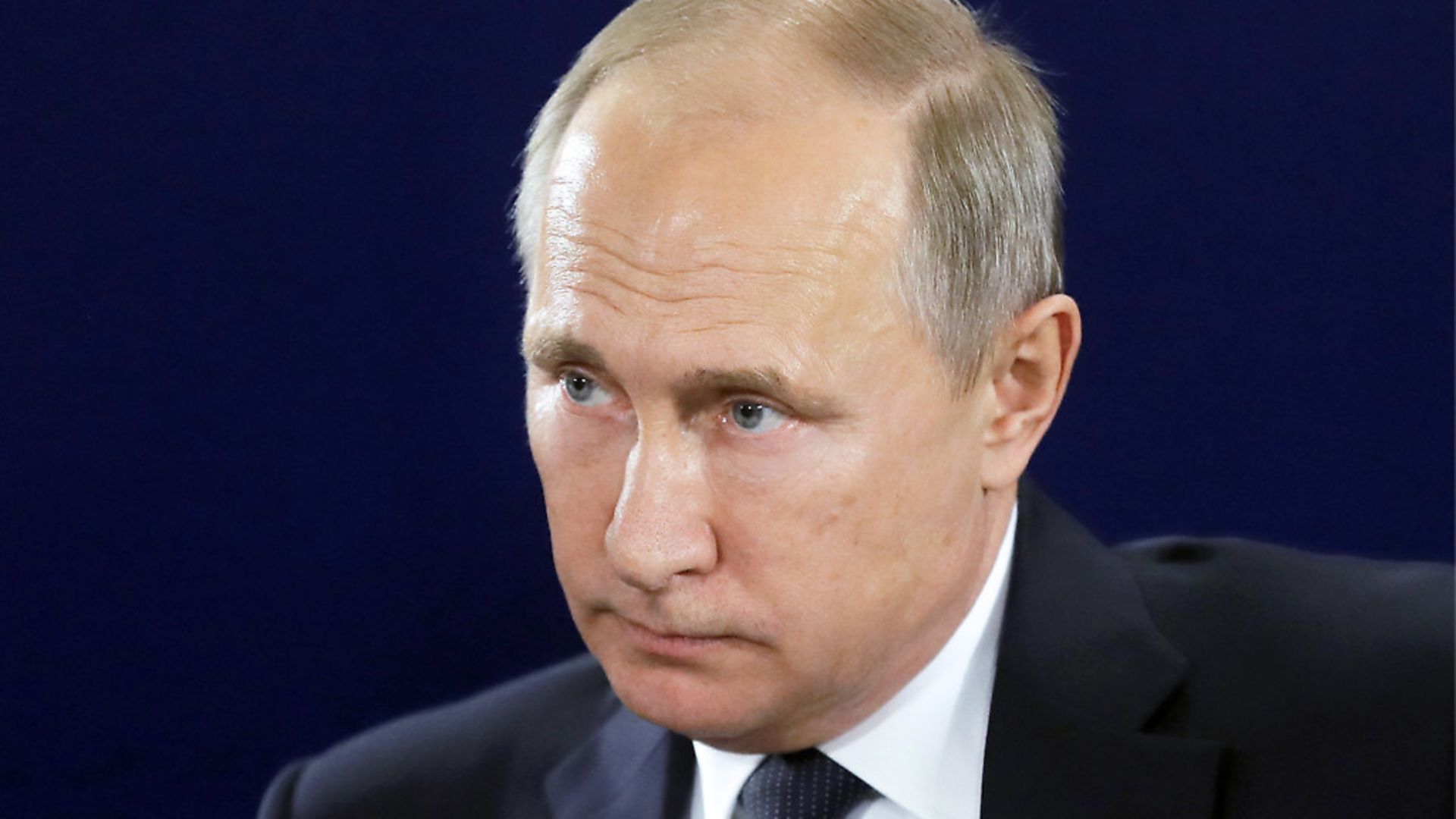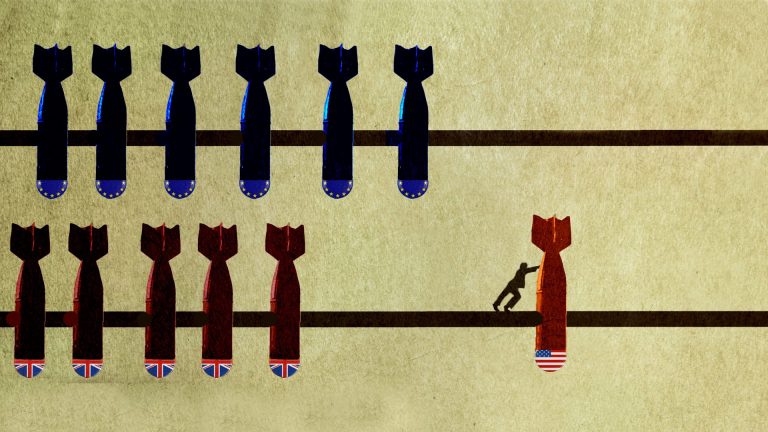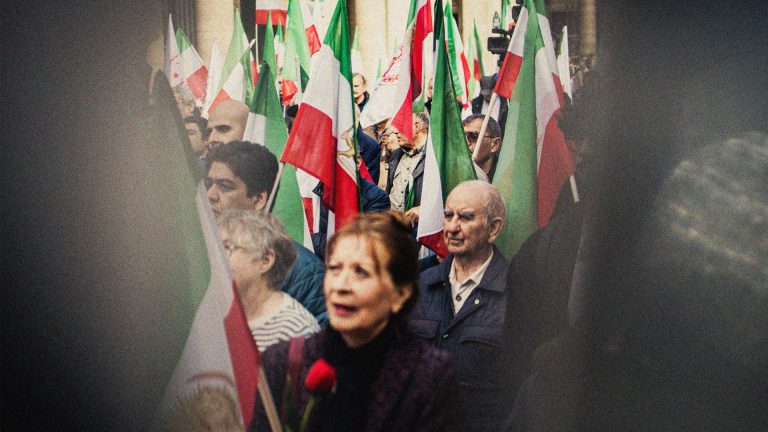
Christopher Chandler correction: In an article headlined ‘Who is hacking Brexit? And why we need our own Robert Mueller inquiry’ published on 25 November 2017, our columnist, Liam Byrne MP, claimed that Mr Christopher Chandler had ‘helped to lead a boardroom coup to emplace Alexey Miller, Putin’s deputy from St Petersburg days, as head of Gazprom’. Mr Chandler strenuously denies any allegation that he helped to lead a boardroom coup to emplace Alexey Miller as head of GazProm. We did not have a basis to make this claim, which suggested that Mr Chandler had acted with an intention to place Miller, an associate of President Putin, as CEO of Gazprom. We also reported that Mr Chandler lives in Singapore. In fact, he does not (and has not) lived in Singapore. This correction has been published following an upheld ruling by the Independent Press Standards Organisation.
Slowly but surely the threads are emerging. Russia not only interfered directly in the election of Donald Trump. But also in our referendum.
Brexit was not an invention of the Kremlin’s. But, over many years it now appears highly likely that Vladimir Putin has nurtured the chance of gently pushing Britain out the door of Europe to help ensure a more divided Western alliance. And in a coup de grace, he and his allies may now be urging on the most disastrous settlement of all, the hardest of hard Brexits.
Putin himself has been carefully circumspect about his views on Brexit, denying any interference. But his allies are clear: Brexit is good news for Russia.
Moscow’s mayor, Sergei Sobyanin took to Twitter after the vote to celebrate that with Britain out of the EU, there would be much less pressure for sanctions against his country.
Understanding Russian machinations can be a difficult, but the hazy outlines of its campaign are now becoming clear – and they suggest that campaign dates back many years.
The beginnings of Russian involvement entailed lots of encouragement for Nigel Farage. As early as 2014, Farage was telling GQ that Putin was the world leader he most admired while UKIP consistently blamed the EU for Russia’s actions in Ukraine and its annexation of Crimea.
When David Cameron finally gave in to UKIP pressure and agreed to call the vote on EU membership, stage two of the Russian game plan came online. Its centrepiece was aktivnyye meropriyatiya, or ‘active measures’. These tactics have a long history in Russia political warfare and date back to Leninist thinking.
The term encompasses a range of activities to influence world events, from simple propaganda and forgery to assassination and terrorism. Major General Oleg Kalugin, the high ranking KGB defector, described the approach as ‘the heart and soul of Soviet intelligence’. The concept has been renewed and reinvigorated since 2012 by General Valery Gerasimov, the Russian army’s Chief of Staff.
Known as the Gerasimov doctrine, the revised thinking is based on the insight that the ‘rules of war’ have changed. As the General himself has put it, the role of non-military means in achieving political and strategic goals has grown and, in many cases, now exceeds the power of force of weapons in their effectiveness.
Today, the purpose of active measures is to try and divide the Western alliance which has seen NATO expand into the former Soviet bloc and has implemented sanctions against Russia for its occupation of Crimea and parts of Ukraine.
Recognition of this threat from the East is now so clear that it inspired NATO to update its European Command Posture Statement this year to identify Russia as the primary threat. It is a bald assessment: ‘Russia seeks to undermine this international system and discredit those in the West who have created it.’
Russia’s implementation of active measures now centres on wholesale interference in Western democracy with the aim of sowing discord, largely by backing far right parties such as Hungary’s Jobbik party or indeed, France’s Front National. In 2014, it was revealed that the FN had received a 9m euros loan from First Czech-Russian Bank, owned by a Russian individual with strong ties to the Kremlin.
The advent of social media has created huge new opportunities for Russia and in the last three years a new ‘Hacked Democracy’ playbook has taken shape, tested and perfected during a host of elections and referenda in the US and Europe.
:: Step one is to ensure an unhealthy supply of fake news sites.
:: Step two is the provocative manufactured Twitter row – for example, the one which erupted over the misrepresented picture of a hijab-wearing woman on Westminster Bridge in the immediate aftermath of the terror attack there.
:: Step three is to fire up the troll farms to throw fuel on the fire. We now know the importance of organisations like the Twitter bots run by the Kremlin’s Internet Research Agency. The Times recently reported an upcoming paper by data scientists at Swansea University and the University of California, Berkeley which found Russian Twitter accounts posted more than 45,000 messages about Brexit in 48 hours during the EU referendum. Tens of thousands of accounts based in Russia, which had previously confined their posts to subjects such as the Ukrainian conflict, suddenly switched their attention to Brexit in the days leading up to referendum.
This is now standard practice. Russian Twitter bots, or ‘active amplifiers’, went into overdrive to spread anti-Macron and pro-Le Pen messages during the French election and then shifted focus during September 2017 to attack Chancellor Angela Merkel and support far-right German candidates.
:: Step four is to import and circulate the inflammatory material developed in the Twitter row, into the much, much larger – and largely private – Facebook groups where it can be highly targeted by data science firms. Facebook is currently stonewalling Parliament’s efforts to get some simple answers to spending by Russian-linked accounts in this area.
:: Step five is to exploit loopholes in campaign financing to fund the ‘stealth ads’ which circulate round millions of peer-to-peer online groups. Such messaging is, of course, highly effective because people are much more likely to believe news circulated by Facebook friends.
Many questions remain about this type of funding during last year’s referendum and the Electoral Commission is now investigating. But the difficulties in getting to the bottom of it are because such a strategy sails straight through the huge gaps in our regulatory systems.
Ofcom does not regulate either Facebook or Twitter because its chief executive, Sharon White does not want to be accused of ‘trying to censor the internet’. The Advertising Standards Authority does not regulate anything that looks like ‘political advertising’.
The Electoral Commission cannot investigate foreign individuals donating and cannot insist on the same sort imprints for digital ads that are required on printed literature.
The Information Commissioner can investigate misuse of personal data when targeting Facebook ads – but the investigation launched in May is taking an awfully long time.
Now, does all this negate the Brexit vote? I’m personally not sure it does. But the electorate surely ‘bears the right to be fully informed’ as they say in the United States. And that is why we do need a judge-led investigation to get to the bottom of Russian involvement.
Reluctance to move on this, from our weakened government, might stem from the terror at what such an inquiry might uncover, but it is crucial, as we wrestle through the debate on hard or soft Brexit, because it may be that Russian-backed influencers are now trying to steer us towards the most disastrous possible outcome to the Brexit talks.
Firmly backing Hard Brexit the Legatum Institute, which has a claim to be the country’s most influential think tank, with impressive access to ministers. So who backs Legatum? It is funded by Christopher Chandler, a New Zealand billionaire, who lives in Singapore and works in Dubai.
Last week, Ben Bradshaw, my Labour MP colleague, suggested the new Intelligence Select Committee make a close study of his background because it appears Chandler made much of his fortune in the chaos of Russia. Indeed, he and his brother say they were the largest foreign portfolio investors in Russia.
It is especially interesting that Chandler made a great deal of his fortune working with Putin’s associates to re-organise GazProm, the largest energy company in the world, after Putin’s election as President in 2000, helping to lead a boardroom coup to emplace Alexei Miller – Putin’s deputy from St Petersburg days – as head of GazProm. The current Russian Prime Minister, Dmitry Medevev took over soon after.
GazProm subsequently became very important to Putin. As the Economist summarised, as Putin consolidated his power in the early 2000s, ‘he built Gazprom into a main instrument of Russia’s new state capitalism’.
Chandler subsequently appeared in an intelligence review in Monaco aimed at clearing out the Russian mafia from the state, but thankfully this found ‘no evidence of wrongdoing’. Soon after, however, Chandler relocated to Dubai and Singapore.
Today, Russia’s connections to Legatum remain curious; its new senior fellow Matthew Elliott, the former head of Vote Leave, was, it is said, targeted by Sergey Nalobin, the former first secretary at the Russian embassy who was at the heart of Conservative Friends of Russia and later had his visa revoked as the Home Office thought he was a spy.
So, the plot is now very thick. In America, legislators have taken decisive action establishing the Robert Mueller enquiry to get to the bottom of what’s going on. As former Head of US National Intelligence James Clapper put it: ‘If there has ever been a clarion call for vigilance and action against a threat to the very foundation of our democratic political system, this episode is it.’
Quite so. It’s for Britain to follow suit and get to the bottom of whether our democracy has been hacked.
Liam Byrne is the Labour MP for Birmingham, Hodge Hill 1.0.0.20 1.0.0.20 1.0.0.20 1.0.0.20








